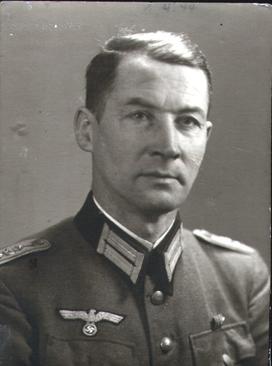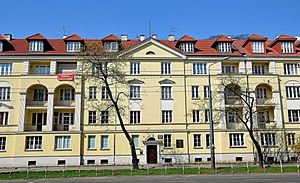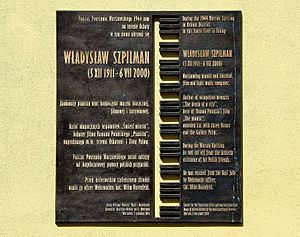Wilm Hosenfeld facts for kids
Quick facts for kids
Wilhelm Hosenfeld
|
|
|---|---|

Hosenfeld in 1939
|
|
| Birth name | Wilhelm Adalbert Hosenfeld |
| Born | 2 May 1895 Hünfeld, Hesse-Nassau, Prussia, German Empire |
| Died | 13 August 1952 (aged 57) Stalingrad, Russian SFSR, Soviet Union |
| Allegiance | |
| Branch | |
| Years of service | 1914–1917 1939–1945 |
| Rank | Hauptmann |
| Unit | Guard Battalion 660 |
| Battles/wars | |
| Awards | Order of Polonia Restituta (posthumous) Righteous Among the Nations Iron Cross |
Wilhelm Adalbert Hosenfeld (born May 2, 1895 – died August 13, 1952) was a German Army officer. He was a school teacher before joining the army. By the end of World War II, he had become a Hauptmann, which means Captain.
Hosenfeld is remembered for helping many Polish people, including Jewish individuals, during the war. This happened in Nazi-German occupied Poland. He famously helped Jewish pianist and composer Władysław Szpilman survive. Szpilman hid in the ruins of Warsaw in 1944. This brave act was shown in the 2002 film The Pianist.
After the war, Hosenfeld was captured by the Red Army. He died while being held by the Soviet Union in 1952.
In October 2007, Poland's president, Lech Kaczyński, honored Hosenfeld. He received the Commander’s Cross of the Order of Polonia Restituta after his death. In June 2009, Yad Vashem in Israel also honored him. He was recognized as one of the Righteous Among the Nations. This award is for non-Jewish people who risked their lives to save Jews during the the Holocaust.
Contents
Wilhelm Hosenfeld's Early Life and World War I
Wilhelm Hosenfeld was born near Fulda, Germany. His family was very religious and Roman Catholic. His father was a schoolmaster. Christian values and helping others were important parts of his upbringing.
He was influenced by his Catholic faith and social work inspired by the Church. He also believed in German patriotism. His wife, Annemarie, also influenced him to become more peaceful. He was also part of the Wandervogel movement, a German youth group.
In 1914, Hosenfeld joined the army and fought in World War I. He was badly wounded in 1917. For his service, he received the Iron Cross Second Class.
Wilhelm Hosenfeld in World War II

Hosenfeld was called into the German army, known as the Wehrmacht, in August 1939. He was sent to Poland in mid-September 1939. He stayed there until the Soviet Army captured him on January 17, 1945.
His first job in Poland was in Pabianice. There, he helped build and manage a camp for prisoners of war. Later, he was stationed in Węgrów and then Jadów.
In July 1940, he moved to Warsaw. He spent the rest of the war there. He worked for Guard Battalion 660. He was a staff officer and the sports officer for the battalion. He organized sports events at the Army Stadium in Warsaw.
How Hosenfeld Changed His Views
Hosenfeld had joined the Nazi Party in 1935. However, as time went on, he became very unhappy with their actions. He especially disliked how Polish people and Jewish people were treated.
He and some other German officers felt sympathy for the people of occupied Poland. They were ashamed of what some of their countrymen were doing. They tried to help people whenever they could.
Hosenfeld became friends with many Poles. He even tried to learn their language. He also went to Mass and confession in Polish churches. This was against the rules.
Hosenfeld's Acts of Kindness
Hosenfeld started helping Poles as early as autumn 1939. He allowed Polish prisoners of war to see their families. He even helped some get released early.
In Warsaw, Hosenfeld used his position to protect people. He helped anyone in danger, no matter their background. This included an ethnic German who was against the Nazis. He helped them get the papers they needed. He also found them jobs at the sports stadium he oversaw.
Hosenfeld surrendered to the Soviets in Błonie. This is a small Polish city near Warsaw. He was with the men from his Wehrmacht company.
Wilhelm Hosenfeld's Imprisonment and Death
After his capture, Wilhelm Hosenfeld was held by the Soviets. He was accused of being involved in activities that led to him being sentenced to a long period of hard labor.
In 1946, Hosenfeld wrote to his wife in Germany. He listed the Jewish people he had saved. He asked her to contact them and ask for their help to get him released.
In 1950, Władysław Szpilman found out the name of the German officer who had helped him. Szpilman tried to get help from Jakub Berman, who was the head of the Polish secret police. Berman told Szpilman that he could not help. He said the Soviets would not release Hosenfeld.
Szpilman did not believe Berman. He felt Berman was very powerful and could have done something. Wilhelm Hosenfeld died in a Soviet prison camp on August 13, 1952. He was 57 years old.
Remembering Wilhelm Hosenfeld
The Film The Pianist
In 2002, the film The Pianist was released. It was based on Szpilman's own story. The film showed Hosenfeld saving Władysław Szpilman. The actor Thomas Kretschmann played Hosenfeld.
Awards and Recognition
In October 2007, Poland's president, Lech Kaczyński, honored Hosenfeld. He was given the Commander’s Cross of the Order of Polonia Restituta. This is a very high Polish award.
Szpilman's son, Andrzej Szpilman, worked for a long time to get Hosenfeld recognized. He wanted Yad Vashem to name Hosenfeld as a Righteous Among the Nations.
On November 25, 2008, Yad Vashem officially recognized Hosenfeld. On June 19, 2009, Israeli diplomats gave the award to Hosenfeld's son, Detlev, in Berlin.
On December 4, 2011, a special plaque was put up in Warsaw. It is at 223 Niepodległości Avenue. This is the place where Hosenfeld found Szpilman. The plaque is in Polish and English. Hosenfeld's daughter, Jorinde, was there for the unveiling.
Awards and Decorations
- Iron Cross of 1914, 2nd class (1917)
- Honor Cross of World War 1914/1918
- Wound Badge in Black (1918)
- SA-Sports Badge in Bronze
- Commander’s Cross of the Order of Polonia Restituta (Poland, October 2007)
- Righteous Among the Nations (November 25, 2008)
See also
 In Spanish: Wilm Hosenfeld para niños
In Spanish: Wilm Hosenfeld para niños
- Oskar Schindler
- Angel Sanz Briz
- Karl Plagge
- Albert Göring
- John Rabe
- Raoul Wallenberg
- Aristides de Sousa Mendes
 | Madam C. J. Walker |
 | Janet Emerson Bashen |
 | Annie Turnbo Malone |
 | Maggie L. Walker |


